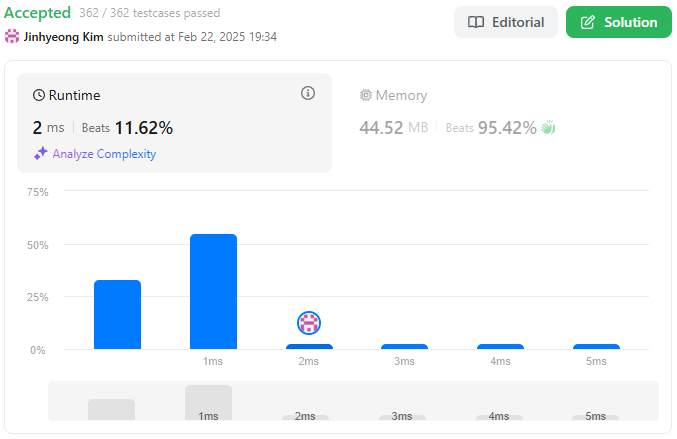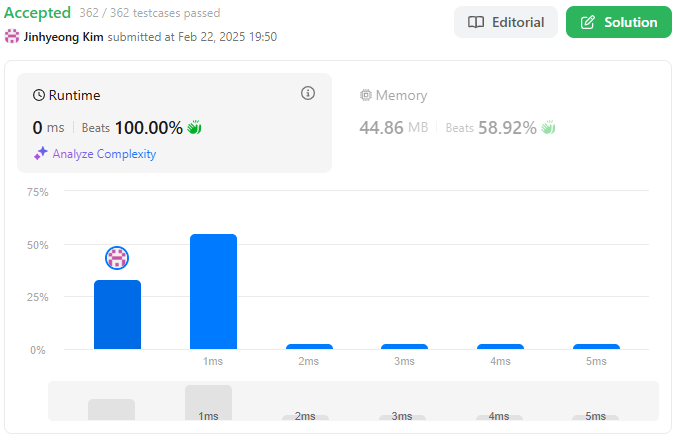💡 LeetCode 26 - Remove Duplicates from Sorted Array
문제
Given an integer array nums sorted in non-decreasing order, remove the duplicates in-place such that each unique element appears only once. The relative order of the elements should be kept the same. Then return the number of unique elements in nums.
Consider the number of unique elements of nums to be k, to get accepted, you need to do the following things:
Change the array nums such that the first k elements of nums contain the unique elements in the order they were present in nums initially. The remaining elements of nums are not important as well as the size of nums. Return k. Custom Judge:
The judge will test your solution with the following code: ```java int[] nums = […]; // Input array int[] expectedNums = […]; // The expected answer with correct length
int k = removeDuplicates(nums); // Calls your implementation
assert k == expectedNums.length; for (int i = 0; i < k; i++) { assert nums[i] == expectedNums[i]; }
1
2
3
4
5
6
7
8
9
> If all assertions pass, then your solution will be accepted.
### 입출력 예제
#### ✅ 예제 1
```bash
Input: nums = [1,1,2]
Output: 2, nums = [1,2,_]
Explanation: Your function should return k = 2, with the first two elements of nums being 1 and 2 respectively. It does not matter what you leave beyond the returned k (hence they are underscores).
✅ 예제 2
1
2
3
Input: nums = [0,0,1,1,1,2,2,3,3,4]
Output: 5, nums = [0,1,2,3,4,_,_,_,_,_]
Explanation: Your function should return k = 5, with the first five elements of nums being 0, 1, 2, 3, and 4 respectively. It does not matter what you leave beyond the returned k (hence they are underscores).
제약조건
1 <= nums.length <= 3 * 104-100 <= nums[i] <= 100- nums is sorted in non-decreasing order.
작성 코드
1
2
3
4
5
6
7
8
9
10
11
12
13
14
15
16
17
18
class Solution {
public int removeDuplicates(int[] nums) {
// 1. 변수 선언 및 초기화
Map<Integer, Integer> numMap = new HashMap<>();
int idx = 0;
// 2. 배열 순회하며 중복 아닌 값으로 재할당
for (int num : nums) {
if (!numMap.containsKey(num)) {
numMap.put(num, 1);
nums[idx++] = num;
}
}
// 3. 반환
return idx;
}
}
HashMap을 불필요하게 사용한 느낌이 들어서 코드를 개선 해보려고 한다.
개선 코드
1
2
3
4
5
6
7
8
9
10
11
12
13
14
15
16
class Solution {
public int removeDuplicates(int[] nums) {
// 1. 변수 선언 및 초기화
int idx = 0;
int beforeNum = 999;
// 2. 이전 값과 현재 값이 다를 경우 배열 갱신
for (int num : nums) {
if (beforeNum != num) nums[idx++] = num;
beforeNum = num;
}
// 3. 반환
return idx;
}
}
회고
HashMap을 사용하면 대부분의 문제가 해결되다 보니 무분별하게 사용을 하게 되는 것 같다.- 그런데
HashMap을 사용하면 값을 넣고 조회하는 부분에서 불필요한 시간 소요가 발생하다 보니 꼭 필요한 경우에만 사용할 수 있도록 해야겠다. - 값을 조회하는 부분에서 시간 소요가 발생하는 이유는
HashCode연산이 발생하기 때문이다.

